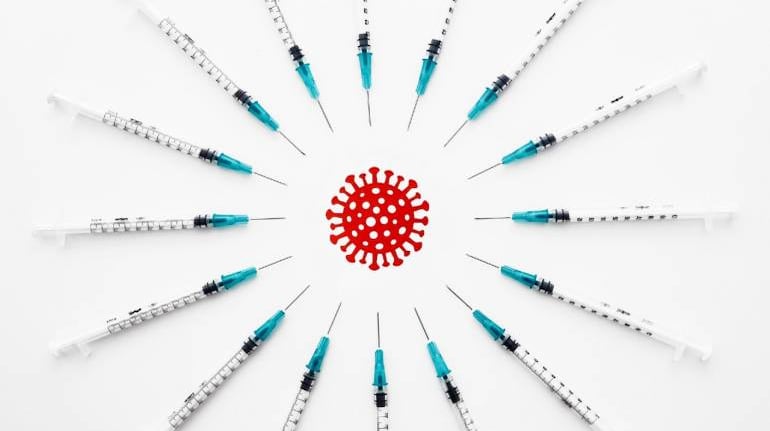January 12, 2022 / 11:42 IST
WHO warns multiple boosters may not be an effective strategyThe World Health Organization has in a statement said that “a vaccination strategy based on repeated booster doses of the original vaccine composition is unlikely to be appropriate or sustainable”. Its technical advisory committee has suggested that a better way would be to provide the initial one or two doses as widely as possible. Why is it important?
Even as countries are recommending and even making booster doses compulsory to manage the Omicron wave, WHO’s statement is a reminder that unless everyone is safe, no one is safe. It emphasises the need for wider inoculation “to mitigate the emergence and impact of new VOCs (viruses of concern) by reducing the burden of infection”. That is, in the long term, to rid ourselves of this pandemic, we need to ensure that new variants do not emerge and for that wider inoculation is the answer. In the short term, wider distribution of vaccines provides protection against severe disease and death.
Story continues below Advertisement
Read also: Coronavirus Omicron Live Updates
COVID-19 loses 90% of its infectiousness within five minutes in air: StudyAfter 20 minutes in air, the virus loses its ability to infect, found a study led by researchers in University of Bristol. It loses 90% of the ability within five minutes.Why is it important?The study indicates that with COVID-appropriate behaviour, the ability of the virus to infect can be significantly reduced. The “greatest risk is when you are close to someone”, according to professor Jonathan Reid, director of University of Bristol’s Aerosol Research Centre, and the person who led the study. Key findings:- Maintaining two-metre distance and wearing a mask may be the most effective ways to protect from an infection.
- The distance between the infected and the vulnerable dilutes the virus-carrying aerosol, and also makes the virus less infectious because of the time it takes to travel to the other.
- Ventilation is important but secondary.
- The virus dries out after it escapes the lungs and its ability to infect is weakened. But, this is also dependent on the humidity of the environment.
South Asia’s health systems may be overwhelmed by Omicron: Red Cross“This latest surge of COVID-19 spells immense danger for millions of people and health systems across South Asia,” said Udaya Regmi, head of IFRC in South Asia, said in a statement. Countries across South Asia from India to Nepal and Bangladesh are reporting alarming increases in COVID-19 infections, with India alone reporting a 2,013 per cent increase in COVID-19 infections in the past month, with cases now topping 179,000 in a day, said the statement.Why is it important?While the variant may be less severe, it can cause fatalities if hospital systems break down. This is particularly so in regions that are still dealing with the more severe Delta variant, like in India. “The new wave is causing further misery for hundreds of millions of people across South Asia, already living in extreme poverty, exacerbated by COVID-19 over the past two years,” the statement read. Covid-19 may become endemic: Europe’s drug regulatorThe spread of Omicron has been so wide that the virus may soon become endemic in the continent, said the European Medicines agency.Why is it important?This means that anyone living in the countries of the continent or visiting them may soon have to accept the virus as part of life. The good news is that the spread and the vaccination may help in the building of natural immunity against the virus, which means COVID-19 may become easier to live with. WHO has already predicted that more than half of Europe will contract the virus.Vietnam okays $15.3 billion aid for pandemic-hit economyTo support businesses ravaged by strict lockdowns, the country has announced a massive financial-aid package, worth 347 trillion dong or $15.3 billion. It is less than half of what had been initially planned, and the fund infusion was lowered on fears of setting off inflation.Why is it important?The country’s economy had been growing at 6-7% over the last few years till the pandemic struck, after which its growth fell to 2.91% in 2020 and still further to 2.58% in 2021. Consumer spending had fallen drastically during lockdowns. Investor interest in the country does not seem to have declined and the International Monetary Fund predicts the economy to grow at 6.6% in 2022. If it has to stay on that path, the economy will need all the help it can get. Key events in India- Centre’s empowered group warns that poll-bound states of UP, Punjab and Manipur are highly vulnerable to the emerging Omicron wave.
- Lakshadweep becomes first in India to vaccinate all 15 to 18-year-olds.
- Kerala’s test positivity rate triples in a week and active cases double.
- Headache, bodyache are primary symptoms among infected, say Karnataka doctors.
- ICMR keeps Molnupiravir out of its COVID-19 management protocol, citing ineffectiveness and safety concerns.
Discover the latest Business News, Sensex, and Nifty updates. Obtain Personal Finance insights, tax queries, and expert opinions on Moneycontrol or download the Moneycontrol App to stay updated!



